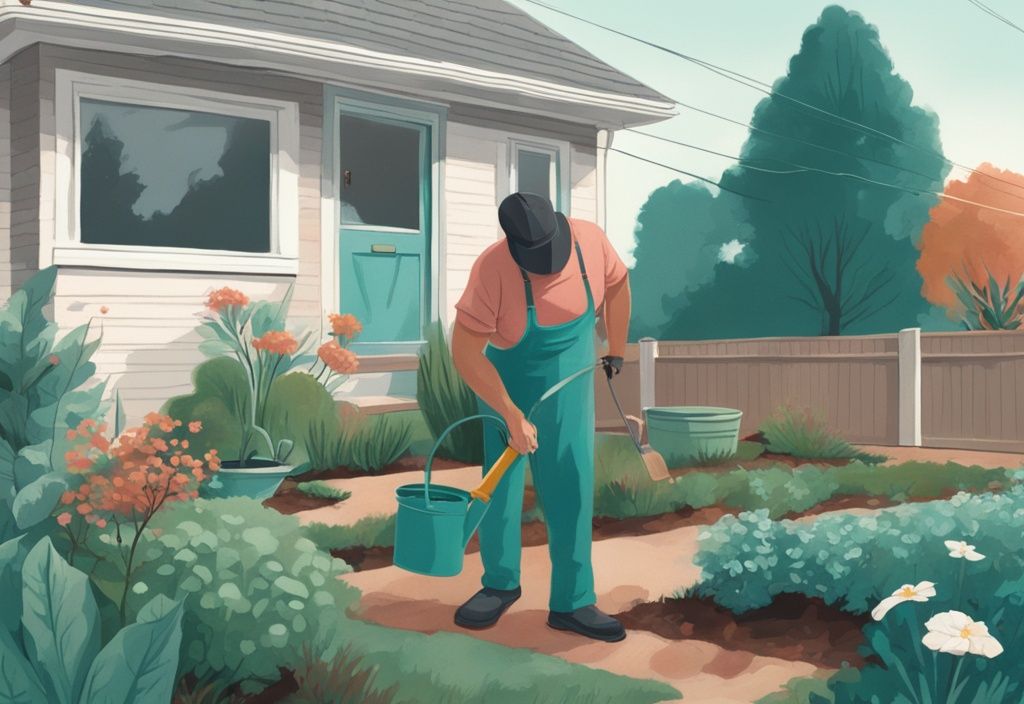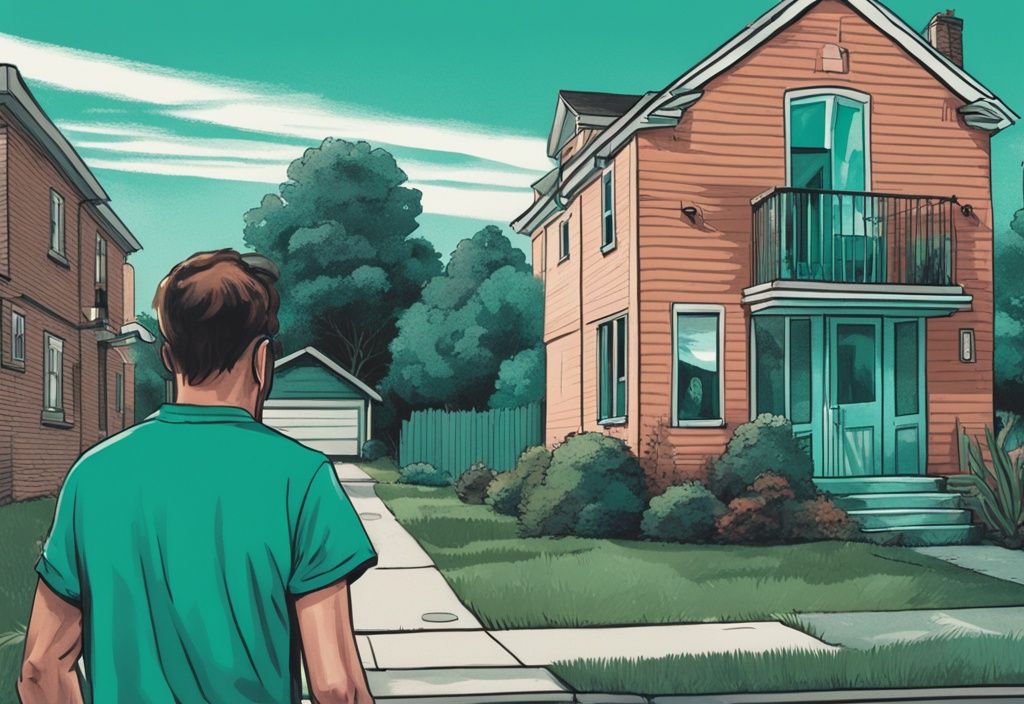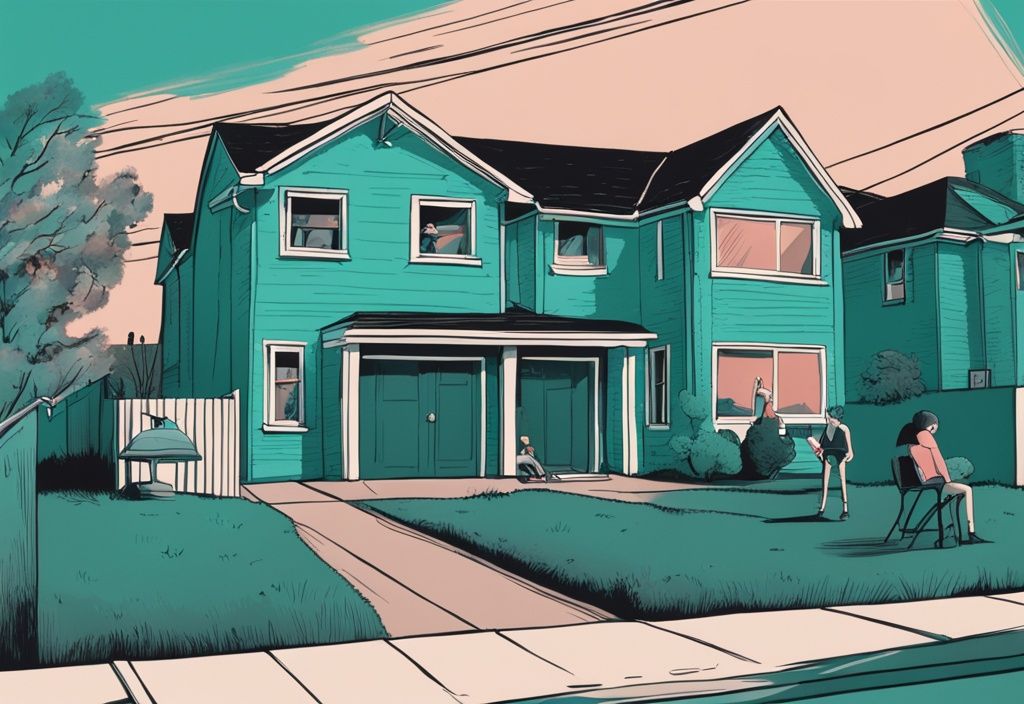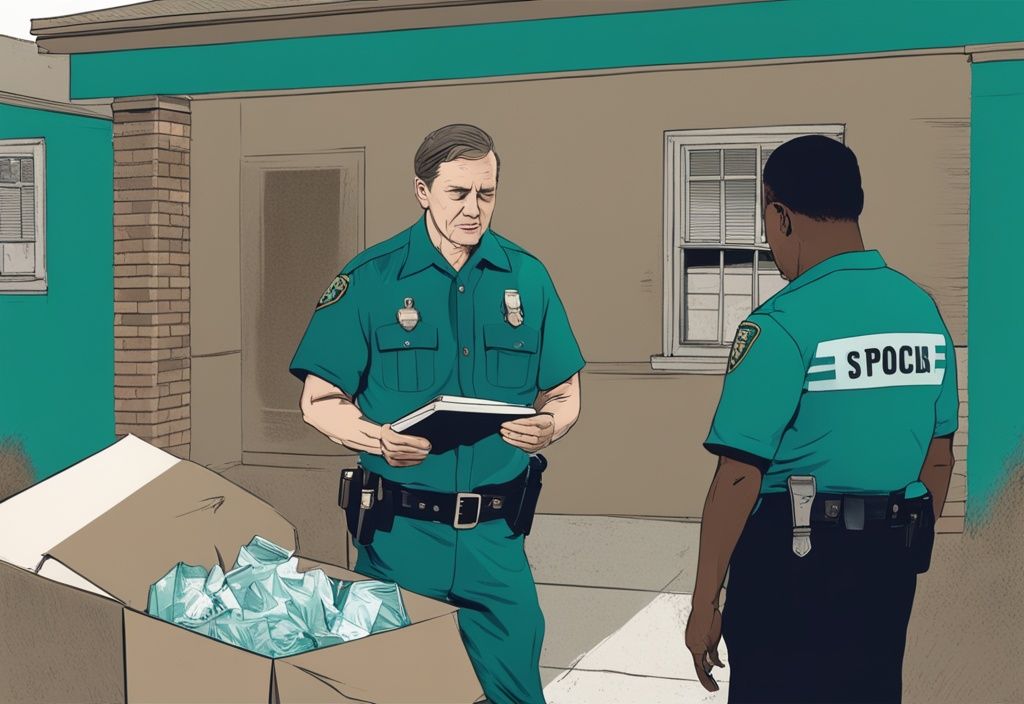Can My Neighbor Record Me on My Property? Your Rights
Ever caught your neighbor’s lens pointed your way and wondered, “Can my neighbor record me on my property?” It’s a question that’s been on the rise in our digital age, where privacy is becoming more elusive. As a seasoned home security expert, I understand your concerns and I’m here to guide you through the maze of privacy laws and rights.
In this article, we’ll delve deep into the legality of recording on private property, and how you can protect your personal space. We’ll also explore the steps you can take if you feel your privacy is being invaded. It’s about understanding your rights, and knowing when and how to take action.
So, ready to navigate this delicate issue? Let’s get started. Remember, knowledge is the first line of defense in protecting your privacy.
Understanding the Legality of Recording on Private Property
When it comes to the question, “can my neighbor record me on my property?”, understanding the legal landscape is crucial. This section breaks down key aspects such as privacy expectations, the distinction between public and private areas, and consent rules.
Reasonable Expectation of Privacy
The concept of a reasonable expectation of privacy is fundamental in understanding the legality of recording on private property. This principle implies that individuals have a right to privacy in areas where they would reasonably expect it.
For instance, private areas within a home such as bedrooms and bathrooms are considered spaces where privacy is naturally expected. Recording in these areas without consent can be deemed a violation of privacy rights.
Therefore, if you are wondering, “can my neighbor record me on my property?”, it’s crucial to assess whether the area being recorded carries a reasonable expectation of privacy.
Public Places vs. Private Areas
The distinction between public places and private areas is critical in determining the legality of recording. Neighbors are generally permitted to record activities that occur in public places like yards or driveways, as these areas do not have a reasonable expectation of privacy.
However, if a neighbor’s camera captures footage of private areas inside your home, such as through a window into a bedroom or bathroom, this could be considered an invasion of privacy.
In such cases, the question “can my neighbor record me on my property?” becomes more complex, as the invasion of private spaces may lead to legal implications.
One-Party Consent Rule
The one-party consent rule is a legal standard that requires at least one person involved in a conversation to consent to audio recording for it to be lawful.
This means that if your neighbor’s camera picks up audio conversations without the consent of at least one party, it could constitute a privacy and legal violation.
Understanding this rule is essential when addressing the question, “can my neighbor record me on my property?” If the audio recording occurs without proper consent, it may be actionable under privacy laws.
Two-Party Consent Rule
In jurisdictions that adhere to two-party consent laws, all parties involved in a conversation must agree to the recording for it to be legal. This rule adds another layer of protection for individuals’ privacy, especially in private settings.
If your neighbor is recording you on your property, and you live in a two-party consent jurisdiction, they must obtain consent from everyone involved in the conversation. Failure to do so can result in legal consequences.

Thus, the impact of these laws is significant when considering the legality of a neighbor recording you on your property.
Legal Implications of Neighbor’s Surveillance
Understanding the legal implications of your neighbor recording you on your property is crucial. This section delves into various aspects of privacy invasion, audio recording laws, and potential legal repercussions.
Invasion of Privacy
Surveillance that breaches an individual’s reasonable expectation of privacy is deemed illegal. If your neighbor’s camera captures footage from private areas of your home, such as bedrooms or bathrooms, it constitutes an invasion of privacy. You have the right to seek civil remedies for this violation, which may include filing a lawsuit for invasion of privacy. Courts often consider the location of the surveillance and the level of intrusion when determining whether privacy has been invaded. Therefore, maintaining documentation and evidence of such surveillance is crucial if you decide to pursue legal action.
Audio Recording Without Consent
Audio recording without consent is a significant privacy and legal violation. If your neighbor’s camera records your conversations without your permission, it is essential to understand the applicable consent laws. Under the one-party consent rule, only one person involved in the conversation needs to consent to the recording. For a detailed comparison of home security options, you can read our guide on Xfinity Home Security vs ADT. However, in jurisdictions with two-party consent laws, all parties must agree to the recording. Violating these consent laws can lead to severe legal repercussions, including criminal charges and civil lawsuits. Therefore, knowing your local consent laws is imperative to determine if a privacy breach has occurred.
Potential Legal Repercussions
The legal repercussions for a neighbor recording you on your property without your consent can be substantial. Violations of privacy laws can lead to both criminal and civil consequences. You may file a lawsuit seeking damages for invasion of privacy, emotional distress, or other related claims. Additionally, the neighbor could face fines or penalties if found guilty of illegal surveillance practices. It is essential to consult with a legal professional to understand your rights and the specific laws in your locality. Always check local city and county guidelines to ensure compliance with privacy and recording laws.
Steps to Take if Your Neighbor is Recording You
Understanding what to do if your neighbor is recording you can be daunting. This guide will help you navigate the steps to protect your privacy effectively.
Gathering Evidence
Gathering evidence is crucial if you suspect your neighbor is recording you. Start by taking clear photos or videos of the cameras installed by your neighbor. Make sure these images capture the camera’s placement and angle, highlighting how they invade your privacy. Additionally, maintain a written log detailing dates, times, and any relevant observations. This comprehensive documentation will be invaluable when explaining your concerns to authorities or legal counsel.
Imagine this: You notice a camera pointed directly at your backyard. Snap a few photos showing its exact position. Then, jot down the date and time you noticed it. This simple act can make a big difference later on.
Contacting Law Enforcement
If talking to your neighbor doesn’t resolve the issue, contacting law enforcement is the next step. When you reach out to them, provide the evidence you’ve gathered, including photos, videos, and your written log. Clearly explain your concerns, focusing on how the camera invades your private areas, such as your backyard or through your windows, and infringes on your reasonable expectation of privacy.
Think of it this way: If someone was peeking through your windows, you’d call the police, right? The same principle applies here. Your privacy matters.
Seeking Legal Counsel
If you believe your privacy rights are being violated, seeking legal counsel is essential. A lawyer can help you understand your rights and the potential legal actions you can take. They can guide you through the complexities of privacy laws and advise you on whether your neighbor’s actions constitute a legal violation. Legal counsel can also assist in filing a lawsuit for invasion of privacy if necessary.
Consider this: A lawyer is like a guide through a dense forest of legal jargon. They help you find the clear path to protecting your privacy. Consulting a lawyer ensures you take the appropriate steps to address the issue effectively.
Preventing Neighbor Surveillance
To maintain your privacy and prevent neighbors from recording you on your property, consider implementing various measures. These strategies not only obstruct the view but also enhance the security of your home.
Physical Barriers
Think about setting up physical barriers to keep prying eyes away. Privacy screens are a great start. They come in different materials and can be customized to match your style. Fences are another solid option. Whether you choose wood, vinyl, or metal, make sure they’re tall enough to block any direct line of sight into your yard. Dense hedges or trees along the property line can also serve as natural barriers, adding both privacy and greenery.

Privacy Screens and Fences
Privacy screens and fences are essential tools for blocking your activity from view and preventing neighbor surveillance. Place privacy screens in areas where you spend most of your time outdoors, like patios or pool areas. They come in various designs—lattice panels, bamboo screens, and fabric barriers—so you can pick one that fits your outdoor decor. Fences offer a more permanent solution. When choosing a fence, consider its height and material to ensure it effectively blocks unwanted surveillance. A solid wood or vinyl fence is ideal for maximum privacy, while a metal fence with privacy slats can also be effective.
Window Coverings
To avoid being recorded by a neighbor’s camera, block your activity from view by closing curtains or using window coverings. Blackout curtains are excellent for complete privacy, as they block out light and prying eyes. Blinds and shades are versatile options, allowing you to adjust the level of privacy and natural light. For a more permanent solution, install frosted or tinted window films. These obscure the view from outside while still letting light filter through. These measures not only protect your privacy but also add an extra layer of security to your home.
The Role of Homeowners Associations (HOAs) in Surveillance Issues
Homeowners Associations (HOAs) can significantly influence how surveillance disputes are handled within a community. Their guidelines and rules often dictate what is acceptable regarding security cameras and recording devices on private property. Understanding these rules is essential for maintaining harmony and respecting privacy boundaries.
HOA Guidelines and Rules
HOAs typically have established guidelines that govern various aspects of community living, including privacy and surveillance. These guidelines often outline what is permissible in terms of installing security cameras and other recording devices on private property. For example, some HOAs may have specific regulations that restrict the placement of cameras to ensure they do not capture footage of neighboring properties, thereby respecting privacy boundaries.
HOAs can also provide a framework for addressing grievances. They offer a clear process for residents to follow when they feel their privacy is being invaded. Understanding and adhering to these guidelines is crucial for maintaining harmony within the community.
Resolving Disputes Through HOAs
When disputes arise over surveillance issues, mediation through the HOA can be an effective means of resolution. The HOA can act as an impartial mediator, facilitating discussions between neighbors to address concerns about privacy invasions.
This mediation process often begins with a formal complaint lodged by the affected party. The HOA will then review the complaint, gather relevant information, and arrange a meeting between the involved parties. During this meeting, the HOA will help both sides understand each other’s perspectives and work towards a mutually acceptable solution. This might involve repositioning cameras, adding privacy screens, or other measures to ensure that the surveillance does not infringe on anyone’s privacy.
Involving the HOA can help resolve the issue amicably, often preventing the need for legal action.
Case Studies and Real-Life Examples of Neighbor Surveillance
Legal Cases Involving Neighbor Surveillance
Several legal cases have emerged where neighbors have taken each other to court over surveillance issues, particularly concerning the question, “can my neighbor record me on my property?” One notable case involved a homeowner who discovered that a neighbor had installed a camera pointed directly into their backyard. The homeowner argued that this was an invasion of privacy, given that the backyard is generally considered a private space. The court examined whether there was a reasonable expectation of privacy in the backyard and whether the neighbor’s actions constituted a violation of this expectation.
Another case revolved around a neighbor who recorded audio of conversations happening inside the complainant’s home. The complainant argued that this violated the two-party consent rule prevalent in their jurisdiction. The court had to determine if the audio recordings were made with the knowledge and consent of at least one party involved in the conversation, as required by law. The legal arguments presented in these cases often hinge on the balance between an individual’s right to privacy and the neighbor’s right to monitor their own property.
Outcomes of These Cases
The outcomes of these legal battles vary depending on the specifics of each case and the jurisdiction’s privacy laws. In the first case, the court ruled in favor of the homeowner, stating that the neighbor’s camera indeed violated their reasonable expectation of privacy. The ruling emphasized that while external areas like driveways might not have the same privacy expectations, backyards can be considered private depending on their use and the presence of physical barriers like fences.
In the second case concerning audio recordings, the court found the neighbor in violation of the two-party consent law. The judgment underscored the importance of obtaining consent from all parties involved in a conversation before recording. This outcome had significant implications, reinforcing the necessity for neighbors to be aware of and comply with local consent laws when using surveillance equipment. In particular, understanding the legalities around a Motion Sensor Security System can help prevent potential legal issues.
The implications of these outcomes for similar situations are profound. They highlight the importance of understanding local privacy laws and consent requirements. Homeowners must be vigilant about the placement and use of surveillance devices to avoid legal repercussions. These cases serve as a reminder that while technology can enhance security, it must be balanced with respect for privacy rights.

FAQ
Can my neighbor legally record my backyard?
Yes, your neighbor can legally record your backyard if it is visible from public areas. However, the legality hinges on whether the recording infringes on areas where you have a reasonable expectation of privacy, such as inside your home.
What should I do if I feel my privacy is being invaded?
If you feel your privacy is being invaded, gather evidence like photos or videos of the surveillance. Discuss the matter with your neighbor. If unresolved, contact law enforcement. Seeking legal counsel can also help you understand your rights.
Are there any legal actions I can take against my neighbor?
You can file a lawsuit for invasion of privacy if your neighbor records you without consent in areas where you have a reasonable expectation of privacy. Consulting a lawyer will provide you with appropriate civil remedies and legal actions.
How can I prevent my neighbor from recording me?
To maintain privacy, consider installing physical barriers like fences or privacy screens. Use window coverings such as curtains or blinds to block the view into your home. These measures can effectively prevent neighbor surveillance.
What role does the HOA play in resolving these issues?
Homeowners associations (HOAs) can mediate disputes about neighbor surveillance. Review the HOA guidelines and rules related to privacy and surveillance. Involve the HOA to help resolve the issue through their established processes.
Conclusion
The article has provided a comprehensive overview of the complexities surrounding the legality of being recorded on private property, particularly addressing the question, “can my neighbor record me on my property?”
We began by examining the concept of reasonable expectation of privacy, highlighting areas within one’s home where privacy is typically expected, such as bedrooms and bathrooms. This understanding is crucial because it sets the foundation for determining whether a neighbor’s recording constitutes an invasion of privacy.
The distinction between public places and private areas was also discussed. Public areas like yards and driveways generally do not have an expectation of privacy, making recordings in these spaces less likely to be deemed illegal. However, if a neighbor’s camera captures activities inside your private areas, this might constitute a privacy violation.
We explored the one-party and two-party consent rules, which are critical in determining the legality of audio recordings. These rules stipulate whether one or all parties involved must consent to the recording, impacting the legality of a neighbor’s surveillance activities.
The legal implications of a neighbor’s surveillance were another key point. Surveillance that breaches an individual’s expectation of privacy can lead to legal repercussions, including potential civil remedies like lawsuits. Understanding these implications is vital for protecting your privacy rights.
If you suspect your neighbor is recording you, it is essential to gather evidence, contact law enforcement, and seek legal counsel. These steps can help you address and potentially resolve privacy violations effectively.
Preventative measures, such as installing physical barriers, privacy screens, and window coverings, were also discussed as practical solutions to maintain your privacy and prevent unwanted recordings.
Finally, the role of Homeowners Associations (HOAs) in resolving disputes was highlighted, emphasizing the importance of adhering to HOA guidelines and rules related to surveillance.
In conclusion, understanding your privacy rights and the legal implications of neighbor surveillance is crucial. If you believe your privacy is being violated, it is important to take appropriate steps to protect yourself and seek the necessary legal remedies.
I’m James Albright, a home security expert with over 15 years of experience, and I’m passionate about helping families protect what matters most. After serving as a police officer, I transitioned to security consulting to share my hands-on knowledge and practical tips. My mission is to make home security simple and reliable by offering clear, no-nonsense advice and easy-to-follow guides. When I’m not reviewing the latest security tech or writing, I’m out in the community leading neighborhood watch programs and, most importantly, keeping my own family safe.





Post Comment